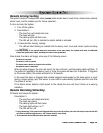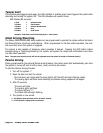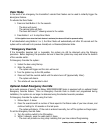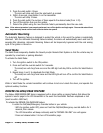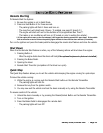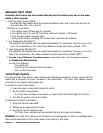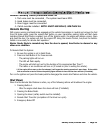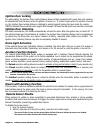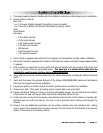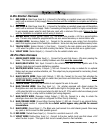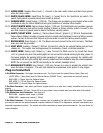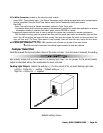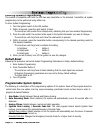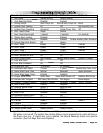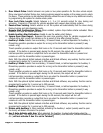
Galaxy 5000/2000RS-DBP - Page 27
1. Thoroughly read and become familiar with the installation instructions before beginning the installation.
2. Review system contents:
Main Unit
1 or 2 One-way 5 Button Remote Transmitters (varies by model)
1 or 2 Two-way 5 Button LCD Remote Transmitters (varies by model)
Siren
Shock Sensor
Harnesses
•
6-Pin starter harness
•
20-Pin main harness
• 4-Pin shock sensor harness
• 3-Pin door lock harness
• LED harness
• Override Switch harness
• 5 Pin antenna harness
3. Verify vehicle is equipped with electronic fuel injection, and starts/idles normally before installation.
4. Determine if vehicle is equipped with a factory theft deterrent system and obtain proper bypass module
if required.
5. Find a location to mount the hood pin switch that will not interfere with the opening of the hood, and
is not in a position that can accumulate water.
The hood pin is a safety device that must be
installed to avoid remote starting during engine servicing.
6. Verify with the owner, the mounting locations for all visible components, including the LED and Override
switch.
7. Verify with the owner, the optional features of the Galaxy 5000/2000RS-DBP Series and the features
that must be programmed during installation.
8. Inspect and perform a function test of all vehicle systems before and after the installation.
9. Always use a Volt / Ohm meter for testing vehicle circuits. Never use a test light.
10. Always look before drilling any holes or mounting self-tapping screws. Be sure fuel lines and exterior
wiring looms are clear as they are often close to the chassis and difficult to see.
11. Protect all wires running from the engine compartment to the interior of the vehicle by covering with
electrical tape and split loom tubing. Be sure to use a grommet when routing wires through the
firewall.
12. Properly fuse any additional accessories such as window modules, door lock actuators, etc., making
sure to power them separate from the alarm module. This will ensure the functionality of the security
system in the event of an accessory failure.
System
Installation



